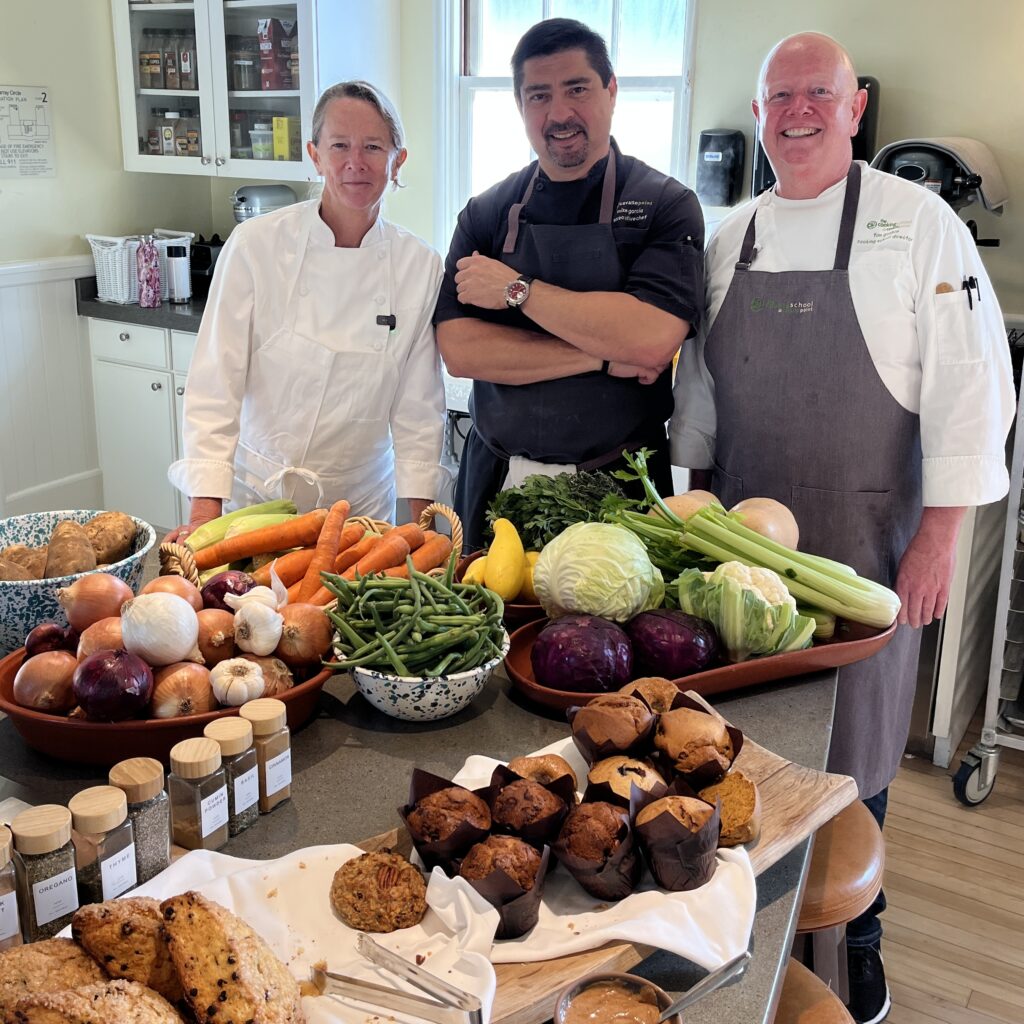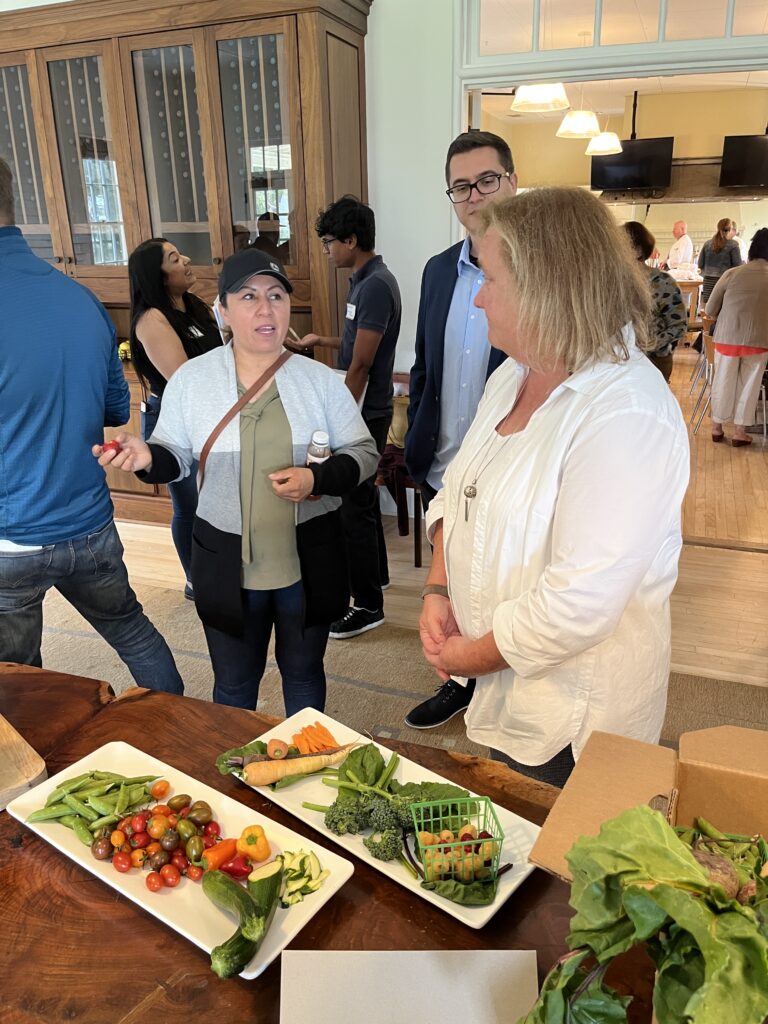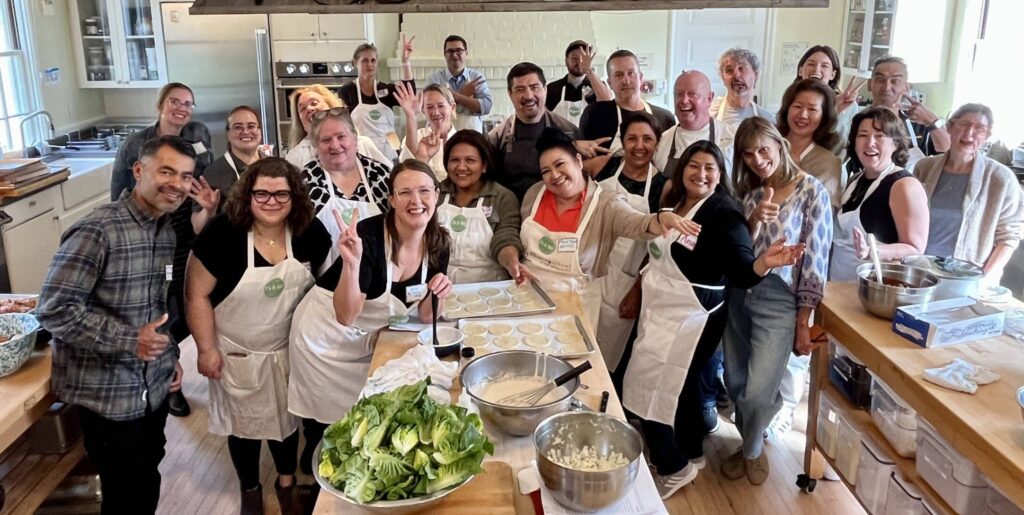“I am a farmer and a mother of three. In my own experience, my three boys would get their breakfast, lunch and afternoon snacks from their schools. At that time, the school meals weren’t as nutritious or healthy. There is a huge opportunity to change this and really impact students with fresh, organic, nutritious meals. This is why I do what I do – take care of the land, grow fresh organic fruits and vegetables – so that students get better nutrition in schools.”~ Yadira Mendiola, Owner, Queen of Vegetables Organic Farm
Why Farm to School?
In the last couple of years, the California State Legislature allocated $60 million to the Farm to School program. First Partner Jennifer Siebel Newsom developed the California Farm to School grant program, in partnership with the California Department of Food and Agriculture, that works closely with California’s first-in-the-nation universal school meals initiative to ensure that two free school meals are locally sourced, nutritious, and delicious. With a strong buy-in from the government, it is an opportune moment to leverage California’s agriculture to promote more local, fresh, organic procurement for schools benefitting the students, farmers, communities, and the planet.
Studies show that farm-to-school initiatives not only raise the intake of fruits and vegetables among kids but also improve their academic performance. Additionally, these programs bolster local economic growth and benefit the environment by lowering greenhouse gas outputs, fostering a new generation passionate about environmental justice. For example, research conducted to analyze the impacts of Oregon’s farm-to-school legislation revealed that every $1.00 schools invest in local food creates $2.16 in additional economic activity in the state economy.
Currently, more than 2 million children in California lack access to nutritious, whole foods. Alarmingly, Black and Latinx children experience food insecurity at double the rate of their white counterparts. Schools play a pivotal role in feeding children, as evidenced by the roughly 3.9 million students in California who qualified for free or subsidized lunches in the 2019-2020 academic year. With California’s recent push for universal school meals, combined with its unmatched agricultural output, the state stands at a distinct advantage to pave the way for a healthier and more just future using groundbreaking farm-to-school initiatives.
Conscious Kitchen & Alice Waters Institute: Crafting a Greener Tomorrow
Conscious Kitchen is a program of Turning Green that has been pioneering the farm-to-school movement in California since 2013. The program was first introduced to Bayside MLK Academy in Marin County, CA to transition school food from heat-and-serve, pre-packaged, and processed to meals prepared with fresh, local, organic, seasonal, and nutritious (FLOSN) ingredients – the five guiding principles for the program. Since then, the program has expanded to many schools and school districts, expanding the farm-to-school movement.
The program is deeply invested in the health and well-being of our kids, lands, farmers, food service teams, climate, and the planet. School food is a high-impact lever that addresses student nutrition and climate action through school-supported agriculture, thus creating an opportunity to expand the supply chain for small BIPOC organic farmers. The program assists farmers with processes that make it easier for them to comply with regulations and supply produce to school districts in a seamless and efficient way. Conscious Kitchen also supports food service teams in school districts to make connections with these farmers and enable a smooth, consistent, reliable, and sumptuous supply chain from farm to school.

Conscious Kitchen’s work has been elevated by collaborations with organizations making incredible contributions to the farm-to-school movement. After working closely with the Alice Waters Institute as thought partners, developing and testing recipes with our student leaders, and hosting workshops for school chefs, the program has been able to reach new heights. Alice Waters founded the Edible Schoolyard Project nearly 25 years ago and the school food paradigm hasn’t looked the same ever since. The Alice Waters Institute serves as a training center for K–12 educators as well as a research hub for leaders in the fields of regenerative organic agriculture, sustainable food systems, climate change, education, and public health.
Engaging Food Service Directors and Shifting the School Food Paradigm
Conscious Kitchen, in collaboration with the Alice Waters Institute, hosted a Culinary workshop for Food Service Directors on the 16th of October at the teaching kitchen in Cavallo Point Lodge, Sausalito. Facilitated by Jennifer Sherman, Culinary Director at the Alice Waters Institute, Mike Garcia, Executive Chef at Cavallo Point Lodge, and Tim Grable, Director of the Cooking School at Cavallo Point Lodge, the objective of the workshop was to create a space for food service teams from different school districts in Northern California to interact with each other, share best practices, scratch cook recipes made from organic ingredients to serve in schools and spark a conversation around increasing organic procurement. See the video recap of the event here.

The workshop started with food service teams from 11 different school districts in Northern California, representing over 190,000 students, sitting around the table for breakfast. No facilitation from the organizers was required to start the interactions. Within minutes directors and chefs started sharing tips, resources, and best practices from their districts. After breakfast, Founder and Executive Director of Turning Green and Conscious Kitchen, Judi Shils, spoke to the group about the multifaceted benefits of shifting school food supply chains to local and organic.
The participants of the workshop were divided into three groups and each chef led a group to cook BBQ chicken with cornbread and cabbage slaw; burrito with beans, cheese, and vegetables; and tofu curry with brown rice and chickpeas. Once again, the participants were up to the task, and with thirty minutes to spare all the dishes were prepared and ready to be feasted upon.

One of the many highlights of the day was being joined by farmers – Yadira Mendiola from the Queen of Vegetables Organic Farm (Royal Oaks, CA), Paul Kolling from Nana Mae’s Organic Farm (Sebastopol, CA), Domatila and Marlen Tapia from Mimi’s Organic Farm (Salinas, CA) and Yesenia Lopez from Narci Organics (San Juan Baptista, CA) – for lunch where they showcased samples of their produce and interacted with food service teams to build relationships to enter the school food marketplace.
During lunch, the farmers got a chance to address the participants and shared their insights from their previous experience in selling to school districts. Yadira spoke about her motivation to increase her business with school districts. She told the participants about her three sons and how she first-hand experienced that they spent half of their days in school and received two and a half meals in their schools contributing to half of the child’s nutrition. She emphasized that her choice of growing organic was because she wanted to impact students directly by engaging in school-supported agriculture.
The Road Ahead: A Step Towards a Healthier Tomorrow
At the end of the workshop, when the space was open for everyone to interact, many food service teams started taking down farmers’ information to place orders in the upcoming weeks. The workshop had already achieved what it set out to do – expand the school food marketplace and the farm-to-school movement with a focus on fresh, local, organic, seasonal, and nutritious food bringing school food service leaders and organic farmers into alignment.
Concluding the enriching workshop, one cannot help but reflect on the potential of farm-to-school initiatives. The discussions, the shared recipes, the aroma of fresh organic meals, and the determination of farmers like Yadira highlight the immense potential and passion driving this movement.

California stands in an optimal position to advance a transformative shift, where schools aren’t just centers of academic learning but are turning into hubs for nutritional education and environmental stewardship. By bridging the gap between local farmers and school kitchens, we’re crafting a future where every plate not only nourishes our children’s bodies but also their minds.
Yet, the work is far from over. To fully realize this dream, continued collaboration, support, and education are crucial. We need more farmers with the same commitment, more food service directors passionate about organic offerings, and more workshops that bring stakeholders together to catalyze change. The Conscious Kitchen, in tandem with the Alice Waters Institute and other invaluable partners, is committed to leading the charge in this direction.
As we step into this future, let’s remember the simple yet profound words of Yadira – an embodiment of why we’re on this journey. Every child deserves the best nutrition, and with every organic meal, we’re sowing seeds for a healthier, more equitable, and sustainable tomorrow. The onus is on us to ensure that every school meal becomes a meal for change.